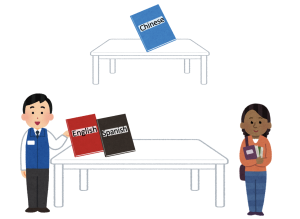Module 23.1 Dialogue
Title
Naomi Johnson shops at a store, looking at multiple items and comparing prices

| Language |
Script and Translation
|
Japanese |
|
Romanization |
1 Jonson: Sumimasen, sono jisho wa ikura desu ka?
2 tenin: Dono jisho desu ka? 3 Jonson: Sono supein go no jisho desu. 4 tenin: Sanzen en desu. 5 Jonson: Ano chuugoku go no jisho mo sanzen en desu ka? 6 tenin: Iie, gosen en desu. 7 Jonson: Jaa, sono supein go no jisho mo ano chuugoku go no jisho mo kudasai. 8 tenin: Hai, hassen en desu. Arigatou gozaimasu. 9 Jonson: Doumo. |
English translation |
1 Johnson: Excuse me, how much is that dictionary (near you)?
2 Store clerk: Which dictionary? 3 Johnson: That Spanish dictionary. 4 Store clerk: (This) is 3,000 yen. 5 Johnson: Is that Chinese dictionary (over there) also 3,000 yen? 6 Store clerk: No, (it) is 5,000 yen. 7 Johnson: Well then, can I have both the Spanish and Chinese dictionaries? 8 Store clerk: Sure, it will be 8,000 yen. Thank you. 9 Johnson: Thank you. |
Vocabulary
Grammar Notes
| こ(ko)・そ(so)・あ(a)・ど(do) |
There are many こ(ko)・そ(so)・あ(a)・ど(do) groups in the Japanese language.
この (kono)・その (sono)・あの (ano)・どの (dono) group is another one in addition to
これ (kore)・それ (sore)・あれ (are)・どれ (dore) mentioned in Module 22.
Summary
| Near the speaker | Near the listener | Away from both the speaker and the listener | Question word | |
| Pointing at the thing | これ | それ | あれ | どれ |
| この + noun | その + noun | あの + noun | どの + noun |
Note that どの (dono) is a question word to ask “which (noun)” among three or more items one would like to get a clarification on.
| この noun | kono noun | this noun (near the speaker) |
| その noun | sono noun | that noun (near the listener) |
| あの noun | ano noun | that noun over there (away from both parties) |
| どの noun | dono noun | which noun |
じしょ
てんいん
ご
えん
ちゅうごくご
くだ
